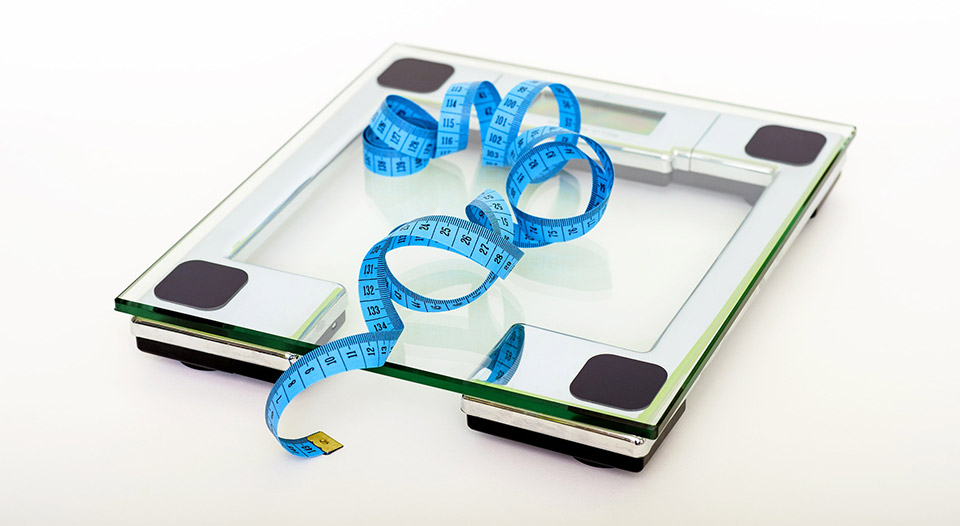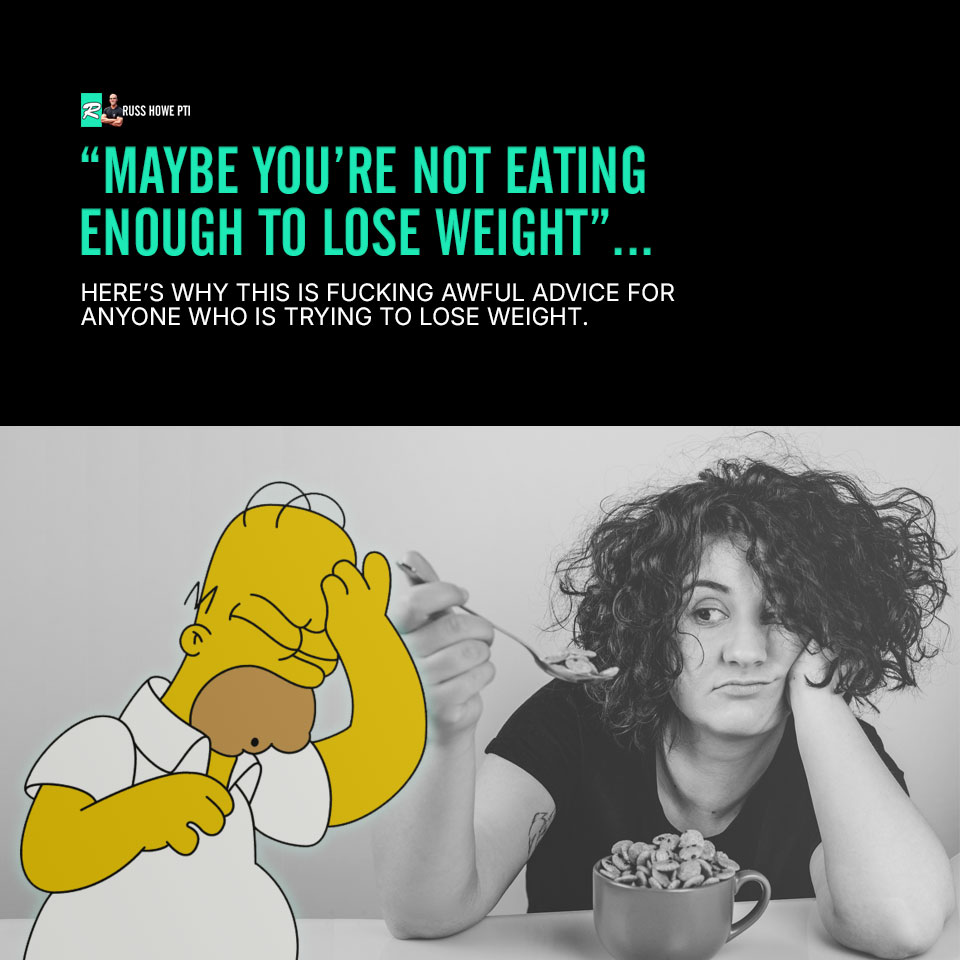I once heard a PT tell a client:

“Okay bro, maybe you’re not eating enough to lose weight…”
Fucking kill me now.
That was 18 years ago, and I still cringe at the thought of it.
Worse still, this phrase has since become one which is regularly muttered on gym floors around the UK, and it often pops up in the media.
All it really does is cause confusion for people who already feel overwhelmed by the nuances of nutrition, so today I plan on throwing all of this bullshit in the bin by revealing the actual science on this topic, to show you once and for all that all of the “influencer” fucknuckles who claim “mAyBe YoU’rE nOt EaTiNg EnOuGh To LoSe WeIgHt” are dead wrong.

What About Starvation Mode?
I’m just gonna come right out and say it: “starvation mode” doesn’t exist!
I’m leading with this somewhat controversial statement because the theory behind the whole “you’re not eating enough to lose weight” schtick always leads back to the idea that you’ve somehow forced your body into so-called “starvation mode”.
This is a state where the body believes it is being attacked by your diet, so it begins to hang onto every last bit of fat in order to protect itself, and therefore you can’t lose any weight – no matter what you do!
This theory makes sense to a lot of people, and it offers an instant (and accountability-free) explanation as to why you can’t shift the needle on the scales no matter how hard you might’ve tried.
Therefore, by telling you to eat more food, the idea is that you’ll get out of “starvation mode” and kick-start weight loss.
There’s just one problem… it’s fucking nonsense.
You see, there hasn’t been a single study (ever!) showing a person has triggered “starvation mode” – nor has there ever been a case (ever!) of somebody who “isn’t eating enough calories to lose weight”.
Indeed, rather than give you actionable nutrition strategies which can help you in the real world, these fucking social media charlatans would happily lead you to believe that you’re the first person in history to “starve yourself fat”.
We must also look at global statistics here, because if “starvation mode” was real, then starvation itself wouldn’t occur. I mean, the people in 3rd-world countries would no longer need to worry about walking several miles per day for food if they could just hop on Susan-from-HR’s “28 day detox cleans” and miraculously force their body into “starvation mode”, enabling them to gain weight while starving.
Sounds ridiculous now, doesn’t it?
But hey, that won’t stop your resident workplace bell-end from trying to convince you that this is a real thing which only happens to Americans and Europeans who work in office jobs and read celebrity gossip magazines.
Anyway, we can draw a line under all of this “stavation mode” nonsense by taking a look at the results of a study which was published all the way back in 1944, where researchers at the University of Minnesota were testing out ways to refeed the world’s hungriest countries after World War II. (7)
This was one of the biggest (and most brutal in its methodology) studies ever conducted.
The researchers took a group of 36 men and literally starved them whilst having them complete a gruelling 3-hours of exercise every single day.
Holy flaps!
And guess what… so-called “starvation mode never arrived.
Instead, the trainees just kept losing weight until the whole process became downright dangerous.
After six months of this torture, the study was drawn to a close, with each person losing an average of craziness the study was over, and each trainee had lost an average of half their body weight, with some almost dying in the process.
NOTE: Before we move on, I’d like to briefly mention metabolic adaptation. Many people confuse this with “starvation mode”, but it’s not the same thing. Metabolic adaptation is a naturall-occuring process by which the body gradually reduces the number of calories you burn throughout the day as you become lighter, because less mass requires less fuel. (8, 9)

The Real Culprit
The reason I came down so hard on “starvation mode” is because it often leads people down a dark path where they begin thinking there is something wrong with their body.
It can lead them to thinking they are “broken”.
That’s not the case at all.
What’s really happening here is mathematics.
Either your calories have been incorrectly set, or you’ve been making misakes in tracking them.
Sorry to call you out on your bullshit, but you want results,not friendship, right?
If your calories were set incorrectly and you have been struggling to lose weight, then increasing them is only going to make you gain weight.
Alternatively, if you haven’t been tracking your calories accurately then your numbers are out of sync anyway. I’ve met countless men and women over the years who ask things like, “Hey Russ, why can’t I seem to lose weight when I only eat 1000 calories per day?”, and the answer is ALWAYS the same – they’re not tracking their calories properly!
In some cases they’re not tracking at all, but for the vast majority of people it’s that they exclude things like drinks, biscuits, and sauces. Heck, some people even exclude their whole weekend! According to MyFitnessPal, there’s a 43% reduction in logins on Saturday and Sundays. All of this basically means that you’re eating more than you fucking think. (5)

How To Fix This
Okay, let’s sort this out.
If you think the reason you can’t lose weight is because your calories have been set incorrectly, we fix this by reducing your target.
You don’t need to do anything drastic here (in fact, it’s best to keep it simple), just reduce your current target by 10% and take note of how your body responds over the next couple of weeks. (6)
Using this approach you will eventually find the “sweet spot”.
Alternatively, if you haven’t been tracking your food properly we fix this by getting a good nutrition tracking app.
I recommend either MyFitnessPal (free) or Carbon Diet Coach (paid but better).
After one week you’ll have proper data to show you where you’re at. You should make a note of how your body responds with that calorie intake, and then follow the advice I gave at the start of this section until you too find the “sweet spot” for results.
Remember, weight loss is governed by the law of thermodynamics (calories in versus calories out).
This means it’s all about how much you put in (by eating) and how you take out (by living/exercising).
There has never been a situation where someone was gaining weight while in a calorie deficit, so any “expert” who tells you that you are “not eating enough to lose weight” is fucking wrong. (1, 2, 3, 4)

What About Weekend Binges?
Here’s the final issue we must address.
If someone constantly falls off plan at the weekend and binges out of sheer frustration, they often don’t track the binges, which makes it easy for them to get confused and think “Why can’t I lose weight then I only eat XXXX calories per day?!” as they remain blisfully unaware of their actual calorie intake.
Frequently doing this tells me that your current diet plan is all wrong for you.
Basically, your current targets are probably too challenging (or the list of foods is too restrictive) for you to adhere to the plan for long enough to see any actual results from it.
This is usually the result of choosing some bullshit fad diet in the hopes of achieving overnight success by trying to hit unrealistically low food targets, or following the advice of a friend who doesn’t like any of the same foods as you.
The right thing to do here is to create a more sustainable diet plan by upping your calorie target so that you can be more consistent in the long-term. I guess this could be seen as “not eating enough to lose weight”, but in reality it’s more like “not eating enough to actually stick to it for longer than 3-4 days before over-eating”. What we want to do here is to ensure you’re still in a calorie deficit, just not an extreme one. In this situation I recommend downloading a good nutrition tracking app then using it for one week to gain some intel, then following the steps I laid out above.
Did all of this make sense?
Great, now get back to the fucking gym!

Further Reading:
If you enjoyed this blog, then you’ll probably also like reading these.
>> Why I Ditched “Clean Eating”
>> Is Food Eaten Late At Night Stored As Fat?
>> Your Macronutrient Ratio Means Dick; Calories Are King
References:
- Howell S., et al. “Calories in, calories out” and macronutrient intake: the hope, hype, and science of calories. Am J Physiol Endocrinol Metab (2017).
- Leibel R.L., et al. Energy intake required to maintain body weight is not affected by wide variation in diet composition . Am J Clin Nutr (1992).
- Golay A., et al. Similar weight loss with low- or high-carbohydrate diets. Am J Clin Nutr (1996).
- Golay A., et al. Weight-loss with low or high carbohydrate diet. Int J Obes Relat Metab Disord (1996).
- Lichtman S. W., et al. Discrepancy between self-reported and actual caloric intake and exercise in obese subjects. N Engl J Med (1992).
- Stewart T. M., et al. Rigid vs. flexible dieting: association with eating disorder symptoms in nonobese women. Appetite (2002).
- Keys A., et al. The Biology of Human Starvation. Civilian Public Service (1944).
- Camps S., et al. Weight loss, weight maintenance, and adaptive thermogenesis. Am J Clin Nutr (2013).
- Zinchenko A, et al. Metabolic Damage: do Negative Metabolic Adaptations During Underfeeding Persist After Refeeding in Non-Obese Populations? Medical Research Archives (2016).







Leave a Reply